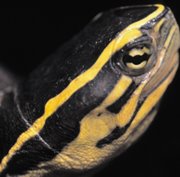
This spring will see wild beavers back in Britain; the first since they were wiped out by fur hunters in the 16th century.
Four beaver families arrived in the UK in November last year from Norway, and are still in a six-month quarantine period before being tagged and released into the Scottish countryside, in a trial project to determine the potential success of a widespread reintroduction. The beaver project will be the first formal reintroduction of a native mammal to the UK.
The Scottish Beaver Trial will be run over the next five years by the Scottish Wildlife Trust and the Royal Zoological Society of Scotland, and monitored by Scottish Natural Heritage. If the project is successful, then it is hoped beavers will be widely introduced.
The reintroduction of the beavers will have a number of positive effects, says ecologist Derek Gow, in an interview with the Guardian's Paul Evans.
Beavers could help water filtration, removing pollutants and conserving water supply to reservoirs. They are ideal for ecosystem engineering, and they bring real environmental benefits."
Environment Minister Michael Russell also hopes that the beavers will attract visitors: "They are charismatic, resourceful little mammals and I fully expect their reappearance in Knapdale to draw tourists from around the British Isles and even further afield.
"Other parts of Europe, with a similar landscape to Scotland, have reintroduced beavers and evidence has shown that they can also have positive ecological benefits, such as creating and maintaining a habitat hospitable to other species."
And, as Evans writes, such projects can have far-reaching benefits for conservation: "As traditional conservation becomes more difficult, with less money available and less public support in the current financial climate, the reintroduction of charismatic fauna offers conservation bodies a chance to engage with the public in ways that obscure species of plants and invertebrates in isolated nature reserves unfortunately don't."
Opposition to the beaver reintroduction has come from the Scottish Crofting Foundation, plus some forestry and fishing associations, who argue that the beavers could have a damaging effect.
The success of the beavers could pave the way for the reintroduction of more wildlife to Britain, including lynx and grey wolves. Other projects have brought great bustards and white-tailed eagles back, while wild boar reintroduced themselves by escaping from a boar farm in 1987.
Four beaver families arrived in the UK in November last year from Norway, and are still in a six-month quarantine period before being tagged and released into the Scottish countryside, in a trial project to determine the potential success of a widespread reintroduction. The beaver project will be the first formal reintroduction of a native mammal to the UK.
The Scottish Beaver Trial will be run over the next five years by the Scottish Wildlife Trust and the Royal Zoological Society of Scotland, and monitored by Scottish Natural Heritage. If the project is successful, then it is hoped beavers will be widely introduced.
The reintroduction of the beavers will have a number of positive effects, says ecologist Derek Gow, in an interview with the Guardian's Paul Evans.
Beavers could help water filtration, removing pollutants and conserving water supply to reservoirs. They are ideal for ecosystem engineering, and they bring real environmental benefits."
Environment Minister Michael Russell also hopes that the beavers will attract visitors: "They are charismatic, resourceful little mammals and I fully expect their reappearance in Knapdale to draw tourists from around the British Isles and even further afield.
"Other parts of Europe, with a similar landscape to Scotland, have reintroduced beavers and evidence has shown that they can also have positive ecological benefits, such as creating and maintaining a habitat hospitable to other species."
And, as Evans writes, such projects can have far-reaching benefits for conservation: "As traditional conservation becomes more difficult, with less money available and less public support in the current financial climate, the reintroduction of charismatic fauna offers conservation bodies a chance to engage with the public in ways that obscure species of plants and invertebrates in isolated nature reserves unfortunately don't."
Opposition to the beaver reintroduction has come from the Scottish Crofting Foundation, plus some forestry and fishing associations, who argue that the beavers could have a damaging effect.
The success of the beavers could pave the way for the reintroduction of more wildlife to Britain, including lynx and grey wolves. Other projects have brought great bustards and white-tailed eagles back, while wild boar reintroduced themselves by escaping from a boar farm in 1987.
To read more about the project, visit http://www.scottishbeavers.org.uk/








No comments:
Post a Comment